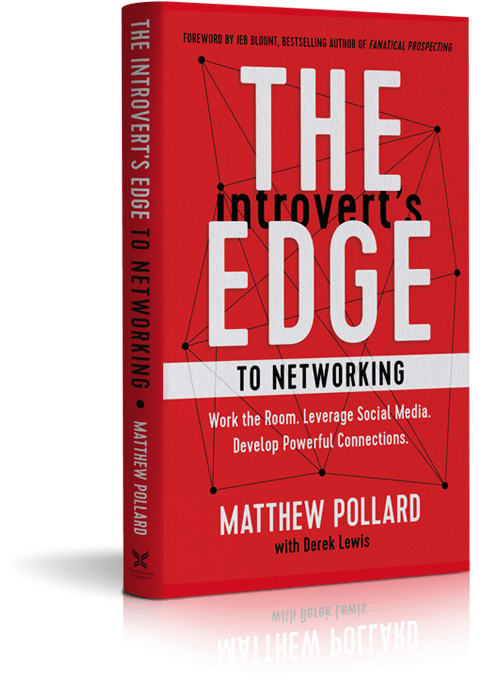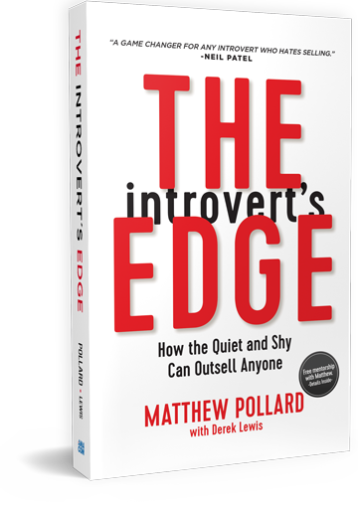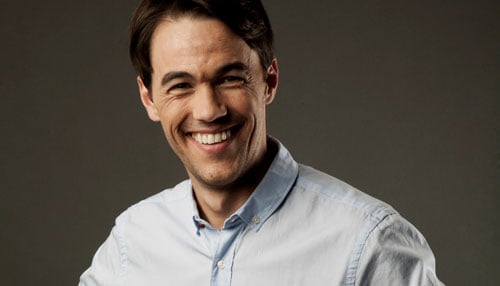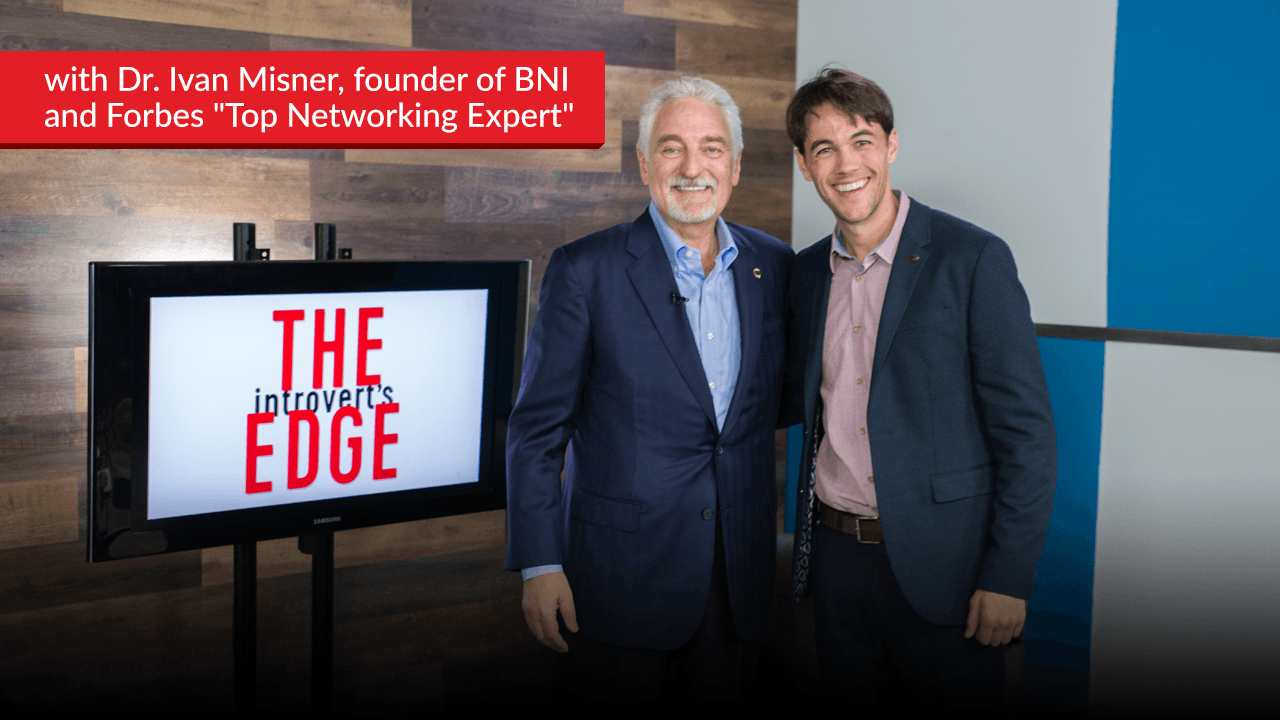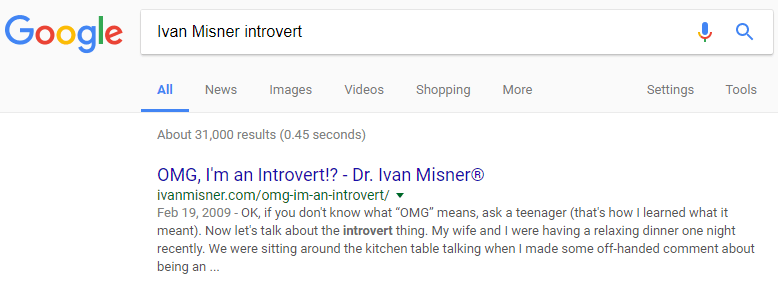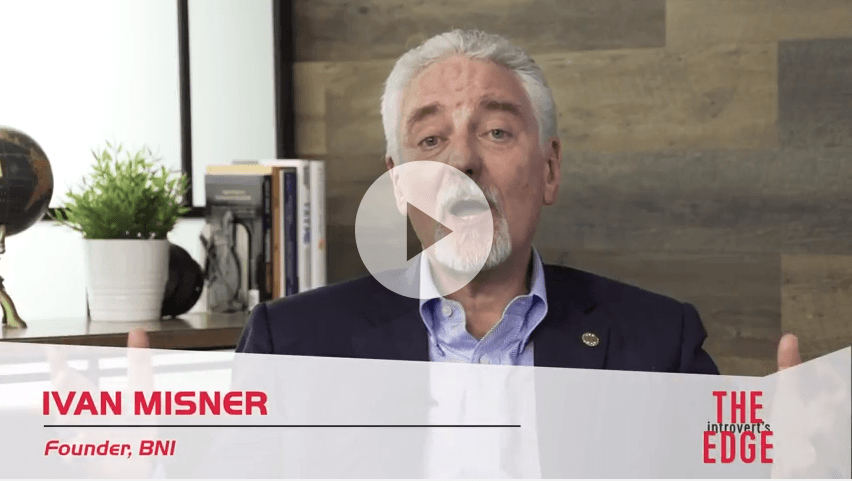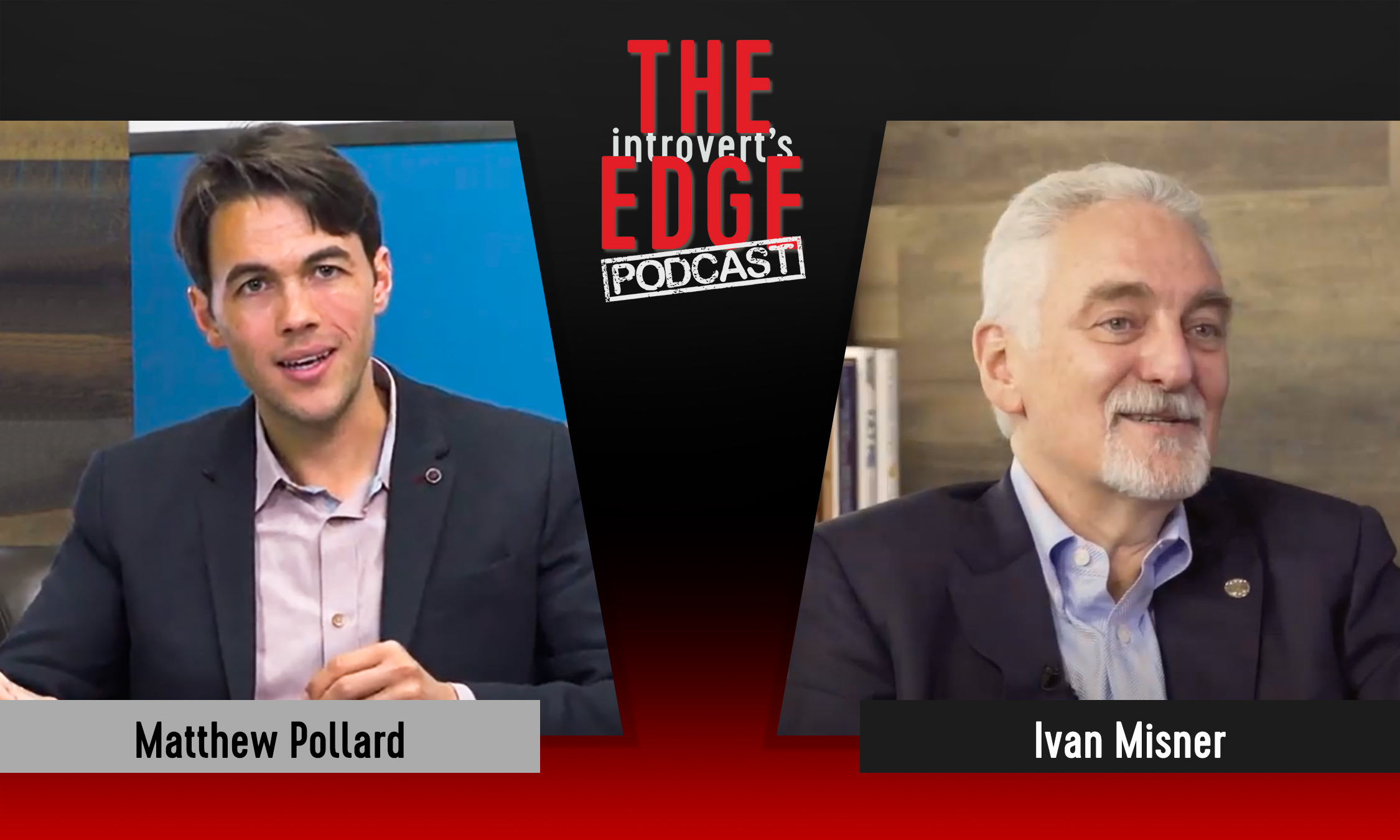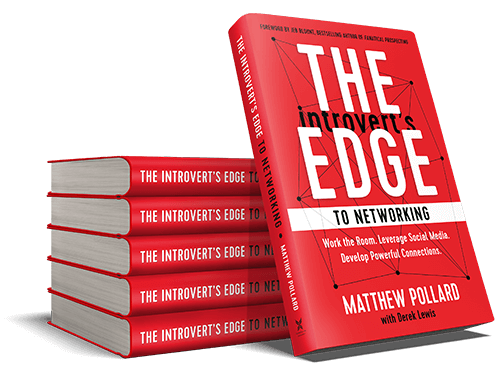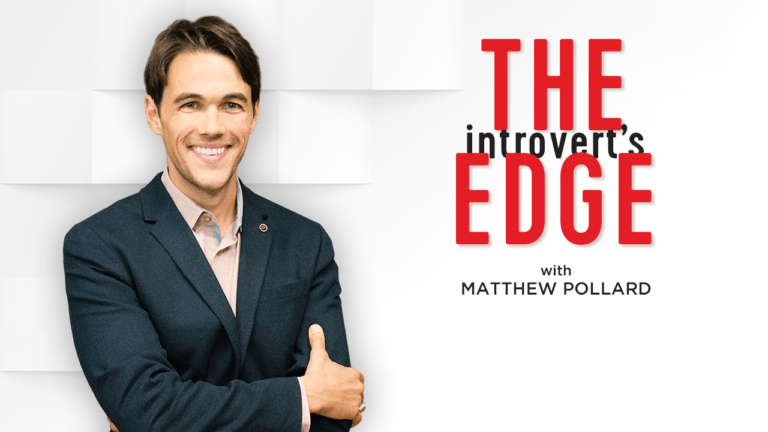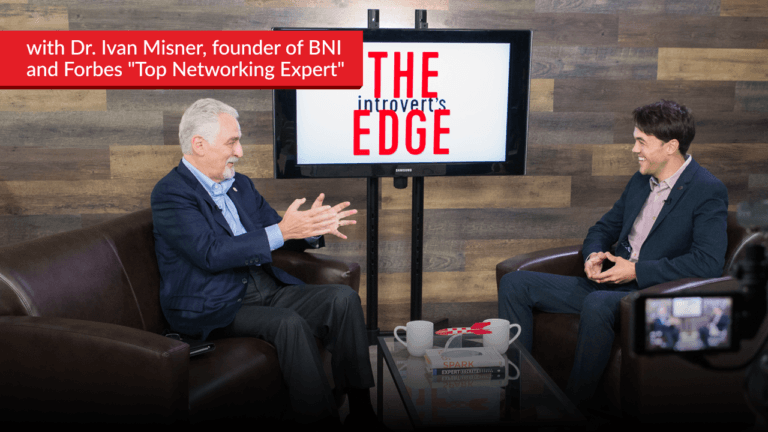SMALL BUSINESS NETWORKING FOR INTROVERTS – TRANSCRIPT
Matt: Hello everyone, and welcome back to another episode of The Introvert’s Edge. Today I’m ecstatic to introduce Ivan Misner. Now Ivan not only is the founder of BNI, who I have a real exciting story to share with you about later, but also is the author of 22 books, a huge number of them around networking. Which if anyone knows BNI, is one of the largest networking groups in the world. Actually the largest networking group in the world with over 8,000 chapters and over 220,000 members.
So while many people watching probably know about BNI, they may not have met Ivan. So I’m looking very much forward to introducing you to Ivan. Ivan, thank you so much for joining us today.
Ivan: Thanks, it’s my pleasure to be on.
Matt: I have to admit I’m ecstatic to introduce you to the Introverted audience because your stories a really interesting one. I have a personal family story about BNI and how it helped my family. I’d really love for the people that are out there listening going what is this BNI thing, just if you could share just a little about what BNI is and how it has really helped the world economy of small businesses.
Ivan: So BNI is a business and professional organization. We allow one person per professional classification to join. We get together every week so we literally have 8,100 meetings every week all around the world. We get together to pass each other referrals and last year we passed 9.9 million referrals.
Matt: So just a couple.
Ivan: Yeah. Generated $11.1 billion US dollars worth of business for our members. Now just so you know, $11.1 billion is the same as the gross domestic product for the country of Liechtenstein.
Matt: Wow.
Ivan: Ok, it’s a small country I know. But how cool is that?
Matt: That is amazing.
Ivan: That we as a business organization could actually generate as much business as a small nation in the world. I’m looking for a bigger nation next year, but I still think it’s amazing.
Matt: What I really enjoy about the whole BNI story is it’s really to the center point if what small business is really just people helping their friends out. And I think that’s something that BNI has really captured it’s essence. Is it always that way? You were sharing off-camera some of the stories about moving into other countries and really the struggles and the successes that you had when doing that. I’d love for you to share that because a lot of people that are watching this show that may be working for a corporation and trying to get buy in from people they may be dealing with other countries or maybe they’re starting their own business, and I think that story would add really great context.
Ivan: So I think sometimes we look at the differences of people as opposed to the similarities. Entrepreneurs worldwide want to do business with people they know, like, and trust. And that’s consistent in any entrepreneurial nation. And that was something that we tapped into in BNI.
But you can’t argue with the cultural differences, because there are cultural differences. So as we opened up in other countries the first thing that people looked at was, “Oh this is so American.” And today I tell people this is the least American thing I’ve ever done. When you think of American business you think of cooperation, collaboration. Our core principle value of “giver’s gain”. You don’t think of that when you think of America, you think of dog eat dog, I’m going to put that guy out of business. That’s what you think about. And so this is the least American thing that I’ve ever done.
Let’s assume that this is American. Rather than argue with those countries we decided to embrace that. So from the very beginning – as a matter of fact the first country we did this in was Australia – where we changed just the spelling of words. Like “check” in the US to “checque”, and instead of saying ‘good morning” it was ‘g’day mate’. And we ended up making 450 changes in our manual.
So the first day of the new chapter after there was a lot of resistance that we’re different Down Under, we showed them the new manual and we said this was started in America but we made 450 changes to the system. And the members looked at me and were like, “Yeah mate, this will work great here in Australia.” So rather than fight it we just sort of embraced it, showed them the program. What we found is that entrepreneurs worldwide want to do business with people that they trust. And if we can get to that then it transcends the cultural differences.
Matt: I think that’s amazing and when I was doing my research on BNI, because I mean my personal story with BNI is that my mother was a struggling introvert as a business coach and she moved out of a big corporate organization and she decided that being a business coach would be what she wanted to do for the next chapter of her life. She then found she had to sell and she had to market and a lot of people with functional skills that’s just not what they’re built for. They assume that if they’re just good at what they do customer will come, build it and they’ll come. And that mindset she discovered very quickly just isn’t the case. And she needed to find a solution.
So she joined BNI and at that stage we didn’t really know what BNI was. And she started going on these dance cards with people which is really an interesting kind of idea. But for her, that was the success of her business. She really struggled with going out and marketing, networking events were not her thing. So going in and talking about what she did that she was a business coach, and while these days I would tell her to say something different, she found that she was in defense mode when people would say, “Yeah, I’ve had a business coach before at work”, where BNI actually got her to be able to share what she did and then be able to have real conversations with people that referred her.
And it really changed everything for her. She went from really struggling to I can say the reason I went to private school the last 2 years was because of BNI. The change in my life was huge because of what my mother was doing, and the change in her confidence was amazing just by having a place to go where their were motivated people to help her. So for that I really thank you for setting that up.
Ivan: Thank you. I really appreciate you saying that. It’s amazing to me how it’s changed so many people’s lives by generating business and relationships. Now you mentioned a dance card, just for clarity, we’re talking about one to one meetings where you sit down and actually meet with somebody. Generally sit down and what I call the “gains exchange”, which stands for goals, accomplishments, interests, networks, and skills. And what you do is you try to look for overlapping areas of interest. Because If you can find areas of overlapping interest, that’s the beginning of building a relationship.
If your network is a mile wide and an inch deep, it’ll never be very strong. So you need a network that is both wide and deep. And those one to ones and dance cards are about going deep and building professional relationships so you can refer each other, because that is the key is passing referrals.
Matt: I think that makes such a difference because I’ve been to so many associations where everybody talks about getting better at their skill, but no one knows what each other does. And in the group people are constantly complaining that no one is referring each other and why is their not that kinship. And every time I’m the odd one out that says no one knows what each other does, why don’t we have a session where we just share what each other do, maybe we meet each other one on one. And that came from the understanding of BNI.
And I think that my mother received a huge amount of business but she also gave a huge amount of business. She met with graphic designers that didn’t business coach, and she met with architects that didn’t business coach, so the referrals she was giving weren’t losing her anything. As a matter of fact they were aiding her because she actually helped those people find solutions to people that they trust.
It’s funny that transaction, people see that if I give somebody else a lead then I’m not making money. And that definitely wasn’t the case, but not only that, people didn’t see that they’re forwarding that relationship with the persona that they’re giving the introduction to because people are like, “Oh, that’s my go to person for introductions”.
Ivan: So it’s really about building social capital. And in order to build social capital you have to make an investment. And social capital actually is a little similar to financial capital. The bank has this expectation that before you write a check you actually put some money into the bank. What happens is we try to write a check on a social relationship, we ask for something before we invest. And so by giving people a referral you’re investing in that relationship. And so it’s easier sooner than later to ask for a withdrawal, to ask for help. But first it helps if you put something into the relationship.
If I can just say one other thing, I think what happens in too many networking situations is that people use networking as a face to face cold calling opportunity, “Hi Matthew my name is Ivan, let’s do business”, and they go straight to doing business.
I did an event in London a number of years ago, about 900 people in the audience. I asked all 900 by starting my presentation asking, “How many of you are here hoping to maybe possibly just sell something?” and 900 people raised their hands. I said, “Great, how many of you are here to just possibly buy something?”, no one raised their hand, not one single person. This is what I call the networking disconnect. People show up at networking events wanting to sell but nobody is there to buy. If that’s why you’re there is to just sell then you’re not going to do very well networking.
Matt: And that transcends continents. What I’ve discovered and doing my research on what BNI is, I thought it was just a western thing or something that would be in a bit of Australia or Europe. You’ve got chapters in Japan and China and the level of respect requirement and giving value in those eastern countries, I mean it’s huge. And it’s so interesting that BNI has been able to transcend the same advice and the same curriculum into those countries. Have you found that the process stays the same or has it changed?
Ivan: There are cultural differences. For example in Japan they have what is called the ‘meishi ritual’, you have a business card and you hold it with both edges and you bow and hand it, you accept the card. You know in America you hand a business card and you just kind of toss it, it’s completely different. So how can it work in western cultures and eastern cultures like that?
It’s easy. We’re not passing rocks to each other, we’re passing business cards. So again we always look at the similarities, what are the similarities. We all pass business cards. Is it different? Yeah, but we’re still passing business cards. And so what BNI has tried to do is to take the similarities and put it in a timed repetition process with some structure and system. You have to have structure and there has to be rules. There has to be rules. Hockey without rules would be boxing on ice.
Matt: With sticks.
Ivan: With sticks, that’s right. And so you have to have rules. We have rules and we get together regularly, we have a process, you can transcend those cultural differences like passing a card pretty easily.
Matt: It’s funny when you say that. So I talk about this cultural, I have a client that helps clients be successful in China. And it’s funny I did a keynote presentation in Thailand and it was all people from Asia. And I’d spoken about it for years but for the first time I experienced it, the level of detail, the bowing and handing the card, the flipping over the card and the pulling out of the card case.
Ivan: Almost always they comment on the cards and that’s important. And you know a lot of particularly North Americans will write, it’s very common to write on the back of a card. Don’t do that. Do not do that in China or Asia, that’s bad form. Even if you ask they’ll say “ok”, but they don’t mean it, it’s impolite.
Matt: The other thing that I’ve noticed here is that people will go to networking events and they’ll collect 30 cards and they’ll go home and say, “Who was that person?” Where in China it’s impossible, when you get a card you have to spend time appreciating it and you lock the name and the detail with the person. And it makes such a difference.
Ivan: It does.
Matt: So it’s interesting that BNI has managed to cross the chasms of some of those remote problems or divides, but created a solid structure. And going back to the concept of structure, because you’re an introvert and it’s funny when I was researching you, I only invite introverts in the show. And I said I really want Ivan to be on the show because you endorsed my book, which I really appreciate, and I wanted to have you on the show but I said I can’t because clearly he’s an extrovert. So I typed in your name and the word “introvert”, and the first blog post that came up was “Oh My God I’m An Introvert”, and it’s such a cool story. So I’d love it if you would share that with us.
Ivan: That’s totally a true story, probably 6-7 years ago I was at home with my wife and our kids were at some school event, a practice so we didn’t have to be there, and we didn’t have the kids there and it was like, “Oh, man. This is what it’s going to be like when we’re empty nesters, it’s wonderful.” And we’re having this great conversation, I don’t even remember what it was about, but I said something to my wife like, “You know me, honey, I’m an extrovert.” And she looked at me and she was like, “Um, no you’re not.” I thought what do you mean, of course I’m an extrovert, I run the world’s largest networking organization, I’m an extrovert. And she said, “Ok, if that’s what you believe, that’s fine.”
I’m a keynote speaker, an author, I have to be an extrovert. She’s like, “Whatever you say”, and I’m like, “What do you mean, ‘whatever you say’?” She said she was reading a book called The Introvert and Extrovert In Love, and here are some of the characteristics of an introvert. And she listed them and I said, ok, that’s like me, but I am not an introvert. How can I run this network and be an introvert?
Then she hit one that just hit home and she said introverts recharge their batteries by being alone or being with loved one’s family, but not out. Wow that hit home with me, because she loved going out, she’s a total extrovert. I need to recharge my batteries alone at home. But I’m annoyed now so I go to my office at home and I get on Google and I find a test to take to show her that she’s wrong. And so I take this test on introvert/extrovert and it says, “Congratulations Ivan Misner, you are an introvert who is a situational extrovert. If you are talking about a topic that you love or if you’re with people that you’re close to you come off as an extrovert, otherwise you are an introvert. Now go apologize to your wife.” Well it didn’t say that, but I did.
So yeah, I was a little surprised. But what was amazing was I started thinking about the network that I created, and I realized that I had created a network really for introverts without even consciously thinking about it. I could have created a network that was a big party, a mixer with lots of people getting together and mingling, but I’m uncomfortable with that. As a matter of fact, even when I go to BNI events, I ask someone to walk me around and introduce me to people because I feel uncomfortable just walking up to a stranger. It’s all about building relationships, a small group of people of 40-50 people usually in a room. And so it’s about going deep and building relationships, it’s not about the party. BNI really is perfect for introverts and I never considered that.
Matt: That’s amazing. And I think one of the really cool things about that is if you’re an extrovert you probably wouldn’t have created BNI.
Ivan: No.
Matt: So I think that a lot of people will see their introverted nature is a disadvantage. They see it as something that gets in their way of success.
Ivan: Yes.
Matt: It sounds like to me – and I don’t want to put words in your mouth – but it sounds like to me introversion was actually one of the things that was critical to the success factors that you had in business and in life.
Ivan: Yeah, absolutely. You know listen, and I’ve said this before I came to the realization that I was an introvert, that I believe introverts and extroverts can be good at networking but they have a whole different set of problems. Extroverts love meeting people, so everyone assumes that because they love meeting people they’ve got to be great at networking.
The problem with extroverts is that they love meeting people, they have no problem walking up and introducing themselves, and what’s their favorite topic of discussion? Themselves. So they’re great at meeting people and they’re great at talking about themselves.
But what I learned many years ago, and I’ve said this for decades, is that a good networker has two ears and one mouth and should use them both proportionately. You should be listening more than you’re talking. It’s almost like a great interviewer. You’re asking me questions and you’re allowing me to elaborate. Well introverts are great at that. Introverts are great at asking questions and getting people to talk.
Extroverts not so much. Extroverts have to learn how to shut up and listen and ask appropriate questions. That comes natural to introverts. The problem with introverts is they have a hard time meeting people. So they need to work on how to meet people and then they’re really good at the conversation. Both have a strength, both have a weakness, and both can be successful if they do it right.
Matt: That’s great advice. You’ve written 22 books and a lot of them – most of them, actually – have a huge amount of networking and how to be successful in that. So I’m looking forward to really picking your brain on that. We’re going to take a short break, we try to keep these episodes to 15-20 minutes, people are driving, so I know people are going to be excited to hear all the different strategies that you’ve created to become a successful networker as an introvert.
Thank you so much to everybody tuning in today and checking out another episode of The Introvert’s Edge. If you’re watching this episode and you’re loving the content, please subscribe to the channel and subscribe on iTunes so that we get more and more introverts to check out this great content. And thank you so much for joining us. Also check out TheIntrovertsEdge.com/Ivan so you can catch the second half of this video interview and really learn from Ivan, really one of the most successful networkers in the planet, and how you can really apply this to you, your business, or your career.
Thanks for joining us today, and Ivan thank you so much. I’m really happy to have you today.







